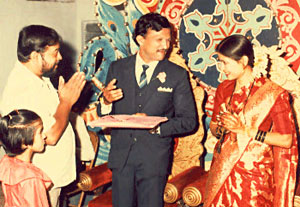 The post wedding rituals of maharashtrian people is different from other states of India. The following are the steps involved in the Post Wedding Rituals:
The post wedding rituals of maharashtrian people is different from other states of India. The following are the steps involved in the Post Wedding Rituals:
Manpan: The families of both exchange gifts in this ceremony.
Reception: The bride wears shalu - jari brocaded silk sari and jewellery presented to her from the groom`s family while the groom wears clothes gifted by the bride`s family. A feast is organized for the guests where all give wishes to the couple along with gifts and bless them.
Varat: Here the bride bids goodbye to her family. The groom picks up the silver idol of parvati that is still sitting on gaurihar. The couple touches the feet of elders then sit in their vehicle in a vehicle and the procession, with a band and fireworks, goes to the groom`s place.
Grihpravesh: The couple comes to the doorstep and the groom`s mother does aarti of the couple. The bride topples a measuring vessel filled with rice. It signifies that the bride will bring luck and prosperity, which will flow in the house like the rice flowing out of the toppled vessel. The couple sits and the groom places the silver idol of Parvati that he carried and places it in a plate of rice and writes the bride`s new name. The groom`s mother sits between the couple and sees the bride`s face in the mirror - this is called soonmukh baghane. The couple gives sugar to all present and they have to take names in verses several times.
Tond Dhune: Tond dhune, the bride`s mother gives a sari and a jewellery piece usually made of pearl to the groom`s mother along with a tea set on the next day after the wedding.
Vyahi Bhet: Vyahi bhet, bride`s father gives a gift made of silver to the groom`s father.
Halad Utaravane: Next day morning, five suvasinis do the same as halad chadhavane but in reverse order. This is to signify that now the couple is free to go out. The groom mother unties Kankan - halkund tied on the couple`s hand.
Tikhati Mejwani: Among non-vegetarian Maharashtrians, a non-vegeterian feast is organized at both the families separately for the close relatives within a day or two.
More on Maharashtrian Wedding
| Wedding Ceremony | Pre-Wedding Rituals | Post Wedding Rituals |
| Wedding Music | Wedding Songs | Traditional Indian Wedding Dresses |
| Bridal Jewelry | Bridal Make Up |
| Sikh Wedding | Buddhist Wedding | Christian Wedding Rituals |
| Sindhi Wedding | Jain Wedding | Hindu Wedding Rituals |
| Parsi Wedding | Jewish Wedding | Muslim Wedding Rituals |
| Prajapatya Marriage | Gandharva Marriage | Asura Marriage |
| Rakshacha Marriage | Paishacha Marriage | Arsha Marriage |
| Daiva Marriage | Brahma Marriage |

















